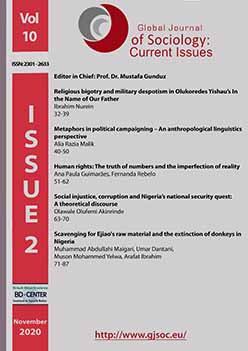Human rights: The truth of numbers and the imperfection of reality
Human rights: The truth of numbers and the imperfection of reality
Author(s): Ana Paula Guimaraes, Fernanda RebeloSubject(s): Human Rights and Humanitarian Law, Penology, Victimology
Published by: Birlesik Dunya Yenilik Arastirma ve Yayincilik Merkezi
Keywords: Human rights; prison sentences; purposes of the penalties; victims of crime; insecureness;
Summary/Abstract: Following the empirical study on the perception that law school students at the Portucalense University had about the respect for human rights, with regard to the subject of prisoners and the manner in which penalties are enforced, we had the opportunity to inquire in the July 2019 a law class, this time comprising Brazilian students from the most diverse states of Brazil and who went to the Portucalense University in Oporto, Portugal, for the sole purpose of attending the Master of Law course, in the area of specialisation in Political and Legal Sciences. This time the study had the purpose of analysing and studying this class, considering the peculiarity of the sample, with unique characteristics. The surveys were distributed and were answered freely, individually and anonymously by 13 students who were present in a classroom. This is a group of students with a middle age ranging between 30 and 40 years and who already had professional work experience in for ensicareas (notaries, judges, lawyers, etc.). We wanted to know to what extent these students were sensitised towards the human rights issues relating to prison sentences, their purposes and ways of execution. We also wanted to verify if the students had in their luggage of knowledge, from the teaching of legal subjects acquired in Brazil, the notions of basic principles the execution of prison sentences. We concluded that these are students receptive to the principles of human rights related to prisoners and their penalties, unanimously defending the end of preventive penalties, even though only one of them said that he felt safe in his country, besides the remaining 12 demonstrated in secureness and 10 out of those 12 have already been victims of crime in Brazil. On the other hand, we recorded curious outcomes and, sometimes some what inconsistent, results that we crossed over so that we can relate them to each other and this can be seen in the rest of the article.
Journal: Global Journal of Sociology: Current Issues
- Issue Year: 10/2020
- Issue No: 2
- Page Range: 51-62
- Page Count: 12
- Language: English

